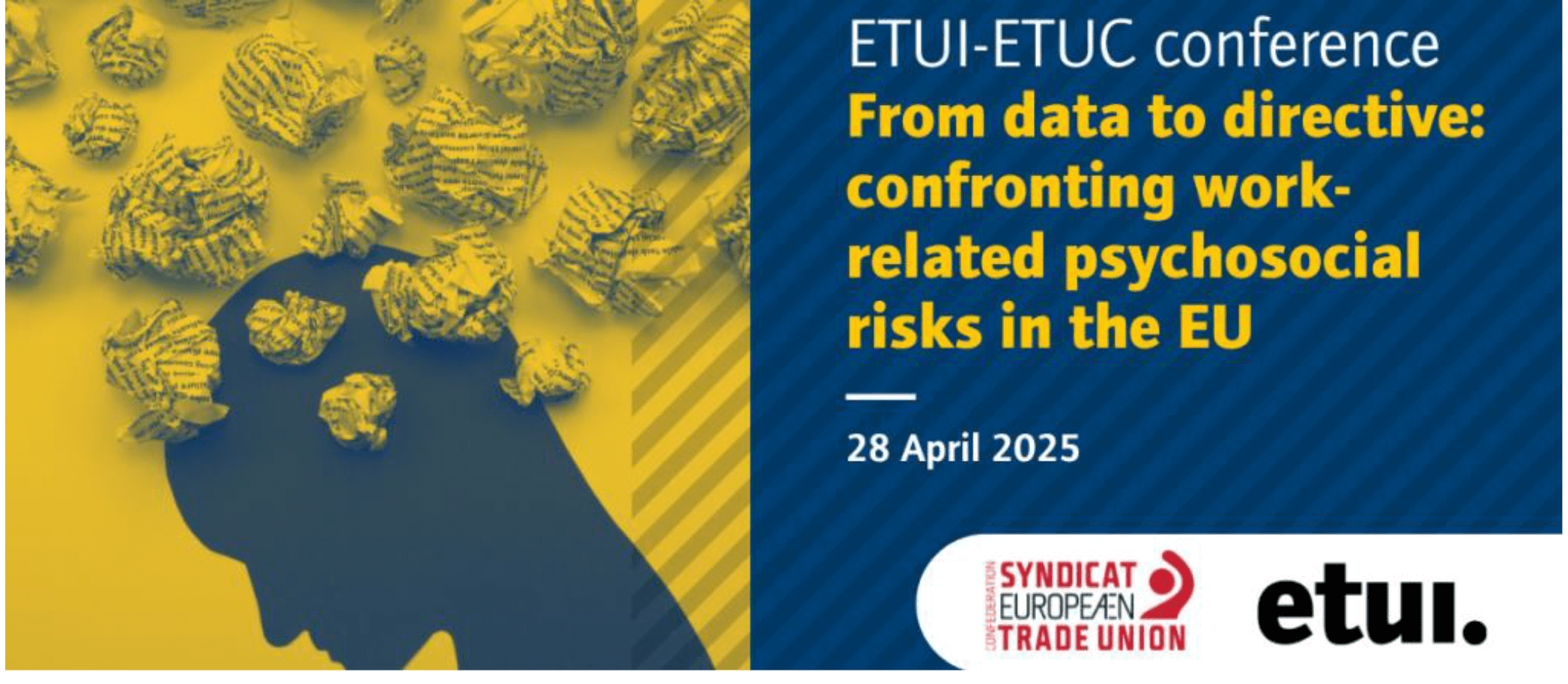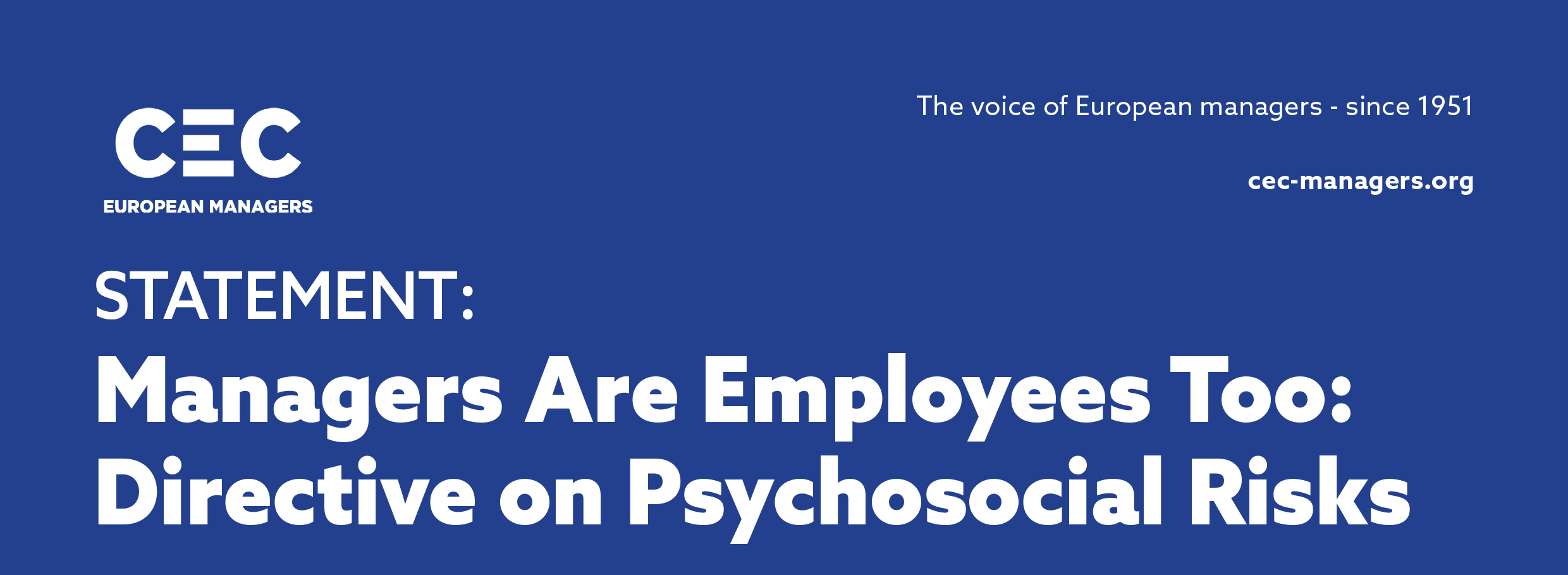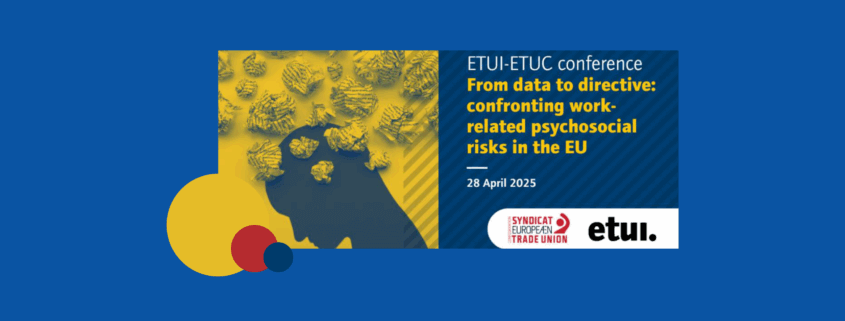Europe Moves Towards Comprehensive Psychosocial Risk Directive
At the ETUI-ETUC Conference titled “From Data to Directive: Confronting Work-Related Psychological Risks in the EU,” a wide array of academics, policymakers, social partners, trade union leaders, and representatives from civil society gathered to listen and learn about the evidence around the subject of psychosocial risks in the workplace.

Participants also demanded urgent action on work-related psychosocial risks. The event, held in Brussels, united key figures around a common objective: ensuring that mental health risks at work are no longer ignored in European policymaking.
CEC European Managers was represented by Olga Molina, Director of the Brussels Office, and Pere Vilanova, Communication Officer.
Managers are affected by psychosocial risks both as leaders and as workers, and this is a message that was also reinforced during the event by Eurocadres, the other European social partner representing leaders and managers.
CEC European Managers also published a statement coinciding with the event.

Download full statement [+]
“Are there good practices out there?”
The conference opened with reflections from Bart Vanhercke, Director of the ETUI Research Department, who emphasized the need for structured action:
“Why should we discuss this at the EU level? Let’s build a narrative to influence the EU agenda“
Bart Vanhercke
Director of the ETUI Research Department
Demi Theodori, Head of the Working Conditions, Health and Safety Unit at ETUI, stressed the urgency: “Burnout, psychological risks are real. If we don’t act, employees may lose their health and employers may lose productivity and their incomes and competitiveness.”
Esther Lynch, General Secretary of ETUC, powerfully advocated for legislative change:
“We want a EU directive that tackles psychological risks linked to the Quality Jobs Strategy Road Map“
Esther Lynch
General Secretary of ETUC
she stated, listing harassment, isolation, and emotional exhaustion as key workplace hazards.
The world of work is rapidly transforming. “AI is gonna do all the easy work — everything that is predictable,” Lynch warned. “AI will be your lazy coworker,” she quipped, highlighting that “many workers are afraid of being left behind.”
Stressing the growing “psychological load” in modern workplaces, Esther Lynch argued that “psychosocial risks must be tackled in the same structured way as other workplace risks.”
The concept of “ethical stress” was another focus. Lynch noted: “It happens when workers cannot act according to their values and beliefs — like a nurse not being able to spend time with patients or a teacher not being able to teach properly. These workers know they are not doing their job in the way they want to, and day after day this leads to dissatisfaction.”
Quoting EU legal foundations, Lynch added, “The EU ‘Precautionary principle’ in the Treaty is an example for the world. We need the EU to take the lead with a directive on preventive measures for psychological risks, not fake guidance.”
Managers’ Unique Role: CEC European Managers’ Manifesto
Representing the voice of Europe’s leadership, CEC European Managers took advantage of the conference to publish their Manifesto: “Managers Are Employees Too: Directive on Psychosocial Risks.”
The manifesto highlights that managers often operate under immense pressure:
“Managers are responsible for ensuring performance and efficiency, often under demanding and complex conditions”.
It stresses that psychosocial risks — such as stress, fear, and conflicting expectations — affect managers too.
CEC European Managers insists that prevention “is not only a moral obligation but a smart investment,” and calls for “balanced, systemic solutions” that protect managers and employees alike.
“Managers can be caught between conflicting expectations, performance pressures, and lack of support,” it notes, emphasizing that mental health protection must extend to leadership levels.
Evidence and Policy iniative
Academics Stavroula Leka and Aditya Jain (University of Nottingham) detailed the conceptual frameworks underpinning psychosocial risks. “We need to define terminology,” Leka pointed out, clarifying that burnout and stress are the outcomes, not the root causes.
“If you want to prevent depression, you need to go a step back; let’s talk about psychosocial risks — I told that to a MEP.”
Stravroula Leka
University of Nottingham
Research by Xabier Irastorza of the European Agency for Safety and Health at Work OSHA, based on the European Survey of Enterprises on New and Emerging Risks (ESENER 2024), revealed troubling data:
24% of EU workplaces don’t conduct a risk assessment because “the hazards and risks are already known.”
54% of German workers worry about increasing work intensity. Measures to prevent psychosocial risks have increased, but significant gaps remain.
In terms of legislation, Stefan Olsson, Deputy Director-General for Employment and Social Affairs at the European Commission, warned that “employers are scared of building a ‘reporting monster’ with too much regulation.” Still, he acknowledged: “Data and evidence are much more important now in policymaking than they used to be.”
Concerning trending concepts in Brussels, such as “competitiveness” and “simplification,” Olsson argued that “Labour shortages are so big that we need to keep people healthy at all costs, therefore, we need healthy workers if we want to be competitive.”
In the roundtable session, Giulio Romani from ETUC reminded the audience that:
“3 million people die globally every year due to work-related causes. The return to competitiveness at all costs is a dangerous approach”
Giulio Romani
Confederal Secretary, ETUC
and pressed for focusing on the mid- and long-term impacts of psychosocial risks.
Estelle Ceulemans, MEP and Member of the Committee on Employment and Social Affairs, stressed political action: “We need a EU directive because there are silent deaths and health problems related to work standards. It is often the case that the most engaged workers are also those who fall under burnout.”
From the managerial side, Nayla Glaise, President of Eurocadres, emphasized, “We need to all speak the same language — clear communication when discussing psychosocial risks.” She pushed for “training for managers,” clarifying that “the responsibility lies with the employers, not the managers themselves.”
In closing remarks, Aude Cefaliello pointed out that while there have been non-legislative efforts like the Framework Agreements on stress and workplace bullying, “legislation is possible — and needed.”
Aditya Jain ended the conference on a hopeful note: “It is possible to have a directive. We can make risk assessments much better, including for psychosocial risks.”



